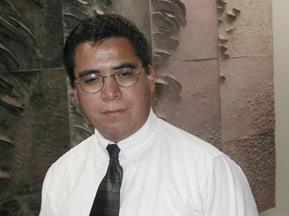Christopher Ochoa

Christopher Ochoa
DNA exonerated Christopher Ochoa of a crime to which he had confessed
Christopher Ochoa, a mild-mannered honor student and editor of his high school literary magazine, spent 12 years in prison for a rape and murder to which he confessed — but did not commit.
He was 22 when he was picked up for questioning for the rape and murder of Nancy DePriest, the 20-year-old manager of a pizza restaurant in Austin, Texas. Although there was no evidence linking him to the crime, which occurred in the early morning hours of October 24, 1988, police told him they knew he was guilty. They said his best friend, Richard Danzinger, was ready to implicate him. They said he would be put into a cell where he would be "fresh meat" for other inmates. They yelled, pounded the table, and threw a chair at him. They told him he would receive the death penalty unless he confessed. They showed him photographs of death row. They tapped him on the arm to show him where the needle would be inserted.
The false confession
After two 12-hour interrogation sessions, Ochoa concluded that he was doomed in any event — that his only choice was between death by lethal injection and life in prison. He chose the latter. To avoid the death penalty, he agreed to sign confessions concocted by the police. And, as part of a plea bargain, he also agreed to testify against Richard Danzinger, who persisted in claiming to be innocent. Both were convicted and sentenced to life in prison.
Eight years later, a convict named Achim Josef Marino sent letters to various Texas officials — including then-Governor George W. Bush — stating that two innocent men were in prison for the DePriest murder, which Marino proclaimed he alone had committed. Although Marino received no response, Austin Police did go to interview Ochoa. Even this far removed from the events that put him and his best friend in prison, however, Ochoa was fearful that claiming innocence would hurt his chance for parole. He told the police he had committed the crime.
Wisconsin project takes case
But three years later, in 1999, Ochoa had a change of heart. He wrote to the Innocence Project at the University of Wisconsin Law School in Madison, seeking assistance. Students there, working under the direction of Innocence Project co-directors Keith Findley and John Pray, began looking into the case. When the students discovered that biological evidence recovered from the victim had been preserved, Findley and Pray sought DNA testing. Finally, late in 2000, DNA and other corroborating evidence proved beyond any doubt that neither Ochoa nor Danzinger had been involved in the crime.
Ochoa's release
On January 16, 2001, the state of Texas and Ochoa's lawyers filed a joint application to set aside his conviction on the ground of actual innocence. Ochoa walked out of court that day into the arms of his sobbing mother and into a world he hadn't seen firsthand in more than a decade. Danzinger's release was delayed until the following March because, while in prison, he had been severely beaten by another inmate and suffered brain damage. He could not be released until adequate arrangements could be made for his care.
— Rob Warden

